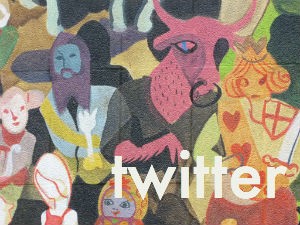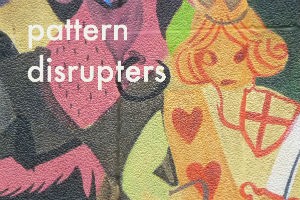Today’s words were triggered by an article published on The Daily Beast, entitled: Keith Olbermann And Why the Powerful Self-Destruct on Twitter by Luke O’Neil.
 The article is about the potentially devastating effects of Twitter rants—specifically to the reputation of high profile people when they get tangled in a fusillade of tweets with trolls or perceived offenders.
The article is about the potentially devastating effects of Twitter rants—specifically to the reputation of high profile people when they get tangled in a fusillade of tweets with trolls or perceived offenders.
Relevance to the heart-based Creative in biz? Well, unless you’ve hit Buddha status, you aren’t immune to getting thrown off by unexpected or unpleasant attacks on your work.
And on top of that, if you’re really digging within and sharing the stuff that fuels your fire, you’re more likely to:
- feel vulnerable and thus more likely to be thrown off when attacked, and
- piss people off (good for you! You’re getting somewhere!)
In other words, sharing your truth doesn’t end when you hit “Publish”.
So what do we want to be aware of in the ensuing ramifications of triggering someone’s ire?
The practice: be aware of when an anger/fear is provoked, hit pause, then decide how to proceed from a conscious space.
As O’Neil makes the case in his article, the best response is typically no-action. Yup.
And most of us know this—but knowing often flies out the window when we’re provoked, eh?
In my experience, knowing don’t mean squat when my fear response is activated. Maybe even less than squat.
Once again, the enemy = stress
 Which brings us to one of the defining characteristics of old-paradigm working: stress.
Which brings us to one of the defining characteristics of old-paradigm working: stress.
Stress keeps you short sighted. It’s a neurological reality.
You’ve likely heard numerous times that stress causes the hormone cortisol to fling you into fight-flight mode. Your brain steals energy from your frontal (what-makes-us-human) lobe to fuel your ability to kick ass or get the hell out of there pronto.
It’s the frontal lobe that allows you to make decisions based on wider considerations than “how dare you say blah blah?”
Considerations like keeping attention on the activities that forward your purpose, realizing that the other person is coming from their own painful motivations, and even awareness of your reputation — these all fly out the window when that flood of cortisol rushes through your body.
The thing is, Twitter, or wherever your alleged social media battle is taking place, does not actually warrant the desperate—unconscious–measures the cortisol is priming you to take.
When disruption is good medicine
You know that pre-frontal (what-makes-us-human) lobe I mentioned earlier? Quite often it takes just a momentary flash of awareness to serve as a pattern-disruptor, i.e. cortisol leads you in a habitual direction, but you don’t have to follow its lead.

In fact, a little disruption to your pre-programmed reaction might be all that’s needed to give yourself the opportunity to ask, “what’s really going on here??” Badda Boom! Back to consciousness.
How do you disrupt when you’re being swept down the valley in a flood?
This is a skill. A lifeskill. (That you weren’t taught at school.)
How do you bring your attention back Home? For the modern day Peace Warrior, the best training for this is meditation. Yup.
Bring your awareness back to your body. Back to your heart. Back to your essence. Back to your life force. Whatever your flavor is.
However, you’re not out of the woods yet.
The momentary flash back to consciousness, I.e. Giving a little jump start spark to your pre-frontal lobe, does not necessarily solve your current freaked out predicament. Nope.
One more step. Choose. Well, one more after that: Act.
What you get by flashing to your pre-frontal lobe is an opportunity to decide how you want to respond. Flash back an incendiary response? Step away? Ignore? Foolishly think you can change their opinion?
Will you or will you not?
Just because you know what the right course of action is, doesn’t mean you’ll take it.

Doing the right thing requires willpower which, as it turns out, requires energy to act on.
Remember, you’re in a situation where someone took issue with your words and is in attack mode, you freaked out, your body went into stress mode, so there’s not a lot of free energy for follow through on conscious-action.
Habitual responses are Strong Patterns. To act outside of those patterns can take something akin to Herculean effort.
Knowing what strengthens willpower can help you find the reserves you need to act well in the moment. Here are three diverse fortifiers:
- Self-care. getting good rest, nourishing well, getting regular exercise, and meditation* (love it!)
- Prevention. When you’re vulnerable, don’t put yourself in a volatile situation. Does that make sense?For ex. if you have a goal of eating less wheat and sugar, walking into a bakery when you’re really hungry is just asking for trouble.
- Strong intention. The more you remain connected to what you desire, the easier it’ll be to act in support of that desire.For ex. when you are solid in your conviction that biz is a vehicle for Love, and the more you explore putting this into practice in various ways, the easier it’ll be to return to it when faced with a challenge.
Being aware of the effects of stress, the importance of disrupting stress patterns, and the role of willpower support you in staying in a conscious space when feeling threatened. And the next question: why did you get triggered in the first place… we’ll leave for another day =)
The world needs you bravely putting forth what only you can bring forth. Stay true to your heart, piss some people off, be compassionate, and do it again.
XO
* I learned this from The Willpower Instinct by Kelly McGonigal, PhD, a health psychologist, which I highly recommend if you’re interested in the subject of willpower. You can also listen to my interview with Kelly on the Authentic Success podcast.
